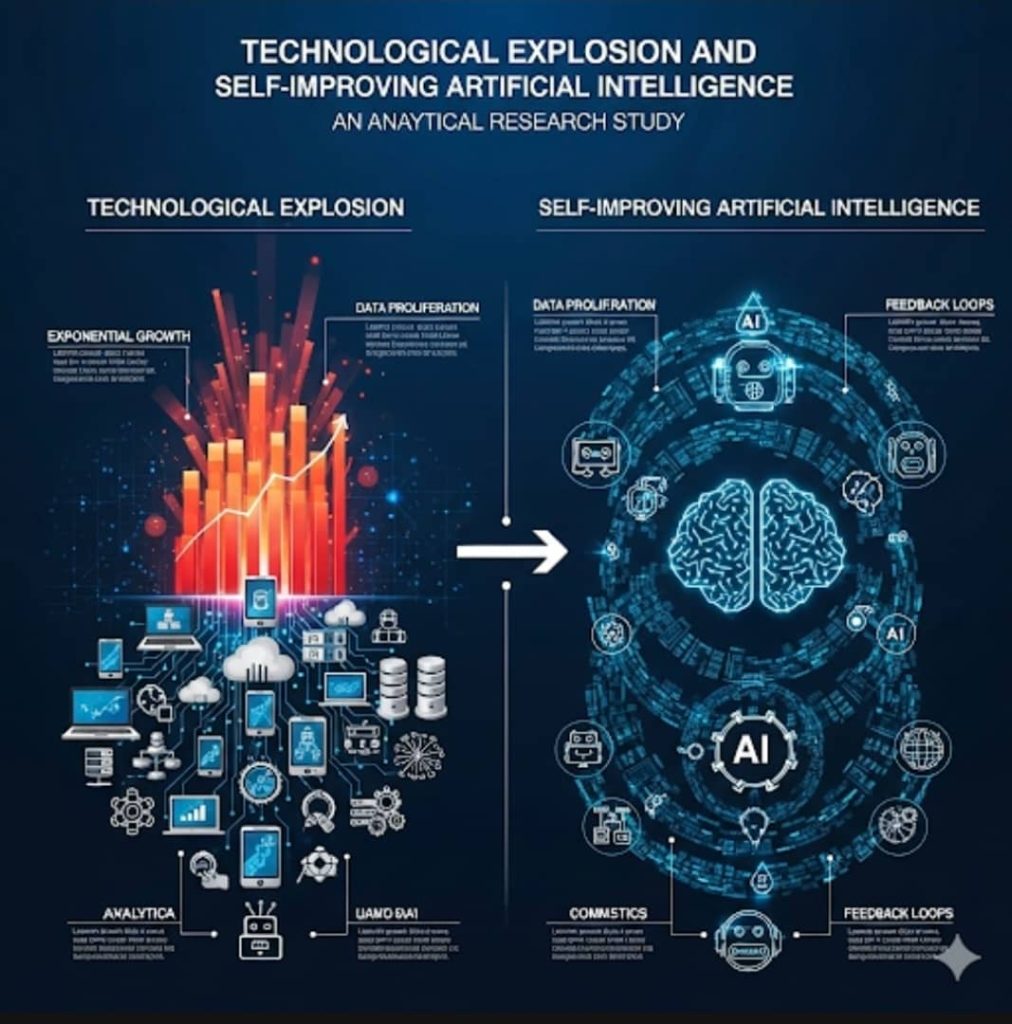بقلم د. عبدالله خليل الخالدي / الانفجار التكنولوجي والذكاء الاصطناعي ذاتي التحسين:

بقلم د. عبدالله خليل الخالدي
Technological Explosion and Self-Improving Artificial Intelligence: An Analytical Research Study
Dr. Abdullah Khalil Alkhalidi
—
Abstract
The contemporary world is witnessing an unprecedented technological acceleration, often referred to as a technological explosion. The exponential growth of intelligent systems and their applications across multiple domains has redefined human life. With the advent of self-improving artificial intelligence (AI), we are entering a new era in which systems can autonomously enhance their performance, redesign algorithms, and generate innovative solutions without direct human intervention. This paper aims to analyze this phenomenon from a scientific and academic perspective, focusing on its technical, philosophical, and ethical dimensions, while exploring the opportunities and challenges it presents for the future of humanity.
Keywords: Artificial Intelligence, Technological Explosion, Self-Improvement, Deep Learning, Meta-Learning.
—
Introduction
Technological transformations are among the most prominent features of the 21st century, ushering in a digital revolution that reshaped human life across economic, social, and cultural domains. Artificial Intelligence (AI) has emerged as one of the key drivers of this change, evolving from a mere tool into a cognitive partner capable of producing advanced problem-solving and creative outputs.
With the rise of self-improving AI, humanity faces a new paradigm of human-machine interaction—one that offers immense opportunities for progress but simultaneously raises existential and ethical questions.
—
Research Problem
How can the technological explosion, manifested in self-improving AI, represent both a civilizational opportunity for humanity and an existential threat if left unguided or mismanaged?
—
Research Objectives
1. To clarify the concept and dimensions of the technological explosion.
2. To analyze the mechanisms of self-improving AI.
3. To explore the scientific and technical foundations of this phenomenon.
4. To discuss its philosophical and ethical implications.
5. To forecast future opportunities and challenges.
6. To propose academic and ethical recommendations for managing the phenomenon.
—
Significance of the Study
Highlights the relationship between rapid technological development and the future of humanity.
Contributes to enriching academic debate on self-improving AI.
Provides a scientific framework to help policymakers design safe and sustainable AI strategies.
—
Methodology
This study employs the descriptive-analytical method, relying on:
Literature review of previous studies and academic resources.
Analytical examination of self-improving AI models.
Future foresight based on scientific evidence and international reports (MIT, Stanford AI Index, DeepMind, etc.).
—
Theoretical Framework
1. Concept of Technological Explosion
Refers to the exponential growth of modern technologies, particularly in AI, where computational power and learning capacity double at unprecedented rates.
2. Self-Improving AI
Autonomous algorithm reprogramming. Continuous adaptive learning. Meta-learning (“learning how to learn”). Genetic algorithms and quantum simulations.
3. Scientific Foundations
Generative AI. Deep Learning. Quantum Computing.
4. Philosophical Dimensions
The debate over artificial consciousness. Limits of machine autonomy. Ethical discourse on existential risks.
—
Discussion and Analysis
Opportunities
Medical revolution (accelerated drug discovery). Intelligent personalized education systems. Solutions to climate, energy, and economic crises. Enhancing human cognition and decision-making.
Challenges
Risk of superintelligence beyond human control.
Algorithmic biases amplified at scale. Overdependence on machines reducing natural human skills. Cybersecurity threats from self-evolving systems.
—
Findings
1. The technological explosion is an exponential phenomenon that cannot be halted but can be guided.
2. Self-improving AI represents a transformative milestone in human knowledge and civilization.
3. Lack of ethical and legal frameworks may turn opportunities into existential threats.
4. Interdisciplinary integration between technology and the humanities is essential to understand the phenomenon.
—
Conclusion
This study concludes that the technological explosion and self-improving AI together represent a historical turning point in human civilization. While they open unprecedented doors for advancement, they also impose ethical, security, and existential challenges that demand global governance and a human-centered vision rooted in justice and sustainability. The greatest challenge is preserving humanity itself in a world heading toward intelligence that surpasses human limitations.
—
Recommendations
1. Strengthen interdisciplinary research between computer science, philosophy, law, and ethics.
2. Establish international legislative frameworks to regulate self-improving AI.
3. Develop ethical oversight systems to safeguard humanity.
4. Invest in ethical AI education and awareness.
5. Create international research centers dedicated to AI’s existential risks.
—
References (Suggested)
Bostrom, N. (2014). Superintelligence: Paths, Dangers, Strategies. Oxford University Press.
Kurzweil, R. (2005). The Singularity is Near. Viking Penguin.
Russell, S., & Norvig, P. (2020). Artificial Intelligence: A Modern Approach. Pearson.
Stanford AI Index (2024). Annual Report on AI Developments. Stanford University.
DeepMind (2023). Research on Reinforcement Learning and Self-Improvement Algorithms.
….
.
الانفجار التكنولوجي والذكاء الاصطناعي ذاتي التحسين: 
 دراسة بحثية تحليلية
دراسة بحثية تحليلية
د. عبدالله خليل الخالدي
ملخص
يشهد العالم المعاصر تسارعًا تكنولوجيًا غير مسبوق، يُشار إليه غالبًا بـ “الانفجار التكنولوجي”. لقد أعادت النظم الذكية، بنموها المتسارع وتطبيقاتها المتعددة، تعريف الحياة البشرية. ومع ظهور الذكاء الاصطناعي ذاتي التحسين، ندخل حقبة جديدة حيث تستطيع النظم أن تعزز أداءها بشكل مستقل، وتعيد تصميم خوارزمياتها، وتولد حلولًا مبتكرة دون تدخل بشري مباشر. تهدف هذه الورقة إلى تحليل هذه الظاهرة من منظور علمي وأكاديمي، مع التركيز على أبعادها التقنية، الفلسفية، والأخلاقية، واستكشاف الفرص والتحديات التي تقدمها لمستقبل الإنسانية.
الكلمات المفتاحية: الذكاء الاصطناعي، الانفجار التكنولوجي، التحسين الذاتي، التعلم العميق، التعلم الفوقي.
مقدمة
تُعد التحولات التكنولوجية من أبرز سمات القرن الحادي والعشرين، حيث دشّنت ثورة رقمية أعادت تشكيل الحياة البشرية عبر المجالات الاقتصادية، الاجتماعية، والثقافية. وبرز الذكاء الاصطناعي كأحد المحركات الرئيسية لهذا التغيير، متطورًا من مجرد أداة إلى شريك إدراكي قادر على إنتاج حلول متقدمة ومخرجات إبداعية. ومع صعود الذكاء الاصطناعي ذاتي التحسين، تواجه الإنسانية نموذجًا جديدًا للتفاعل بين الإنسان والآلة، وهو نموذج يقدم فرصًا هائلة للتقدم ولكنه يثير في الوقت نفسه أسئلة وجودية وأخلاقية.
إشكالية البحث
كيف يمكن للانفجار التكنولوجي، المتمثل في الذكاء الاصطناعي ذاتي التحسين، أن يمثل فرصة حضارية للإنسانية وتهديدًا وجوديًا في آن واحد إذا تُرك بدون توجيه أو سوء إدارة؟
أهداف البحث
توضيح مفهوم وأبعاد الانفجار التكنولوجي.
تحليل آليات الذكاء الاصطناعي ذاتي التحسين.
استكشاف الأسس العلمية والتقنية لهذه الظاهرة.
مناقشة دلالاتها الفلسفية والأخلاقية.
استشراف الفرص والتحديات المستقبلية.
تقديم توصيات أكاديمية وأخلاقية لإدارة الظاهرة.
أهمية الدراسة
تسليط الضوء على العلاقة بين التطور التكنولوجي المتسارع ومستقبل الإنسانية.
المساهمة في إثراء النقاش الأكاديمي حول الذكاء الاصطناعي ذاتي التحسين.
توفير إطار علمي لمساعدة صانعي السياسات في تصميم استراتيجيات آمنة ومستدامة للذكاء الاصطناعي.
المنهجية
تستخدم هذه الدراسة المنهج الوصفي-التحليلي، بالاعتماد على:
مراجعة الأدبيات والدراسات السابقة والمصادر الأكاديمية.
الفحص التحليلي لنماذج الذكاء الاصطناعي ذاتي التحسين.
الاستشراف المستقبلي بناءً على الأدلة العلمية والتقارير الدولية (MIT, Stanford AI Index, DeepMind, إلخ).
الإطار النظري
مفهوم الانفجار التكنولوجي:
يشير إلى النمو المتسارع للتقنيات الحديثة، خاصة في مجال الذكاء الاصطناعي، حيث تتضاعف القوة الحاسوبية وقدرات التعلم بمعدلات غير مسبوقة.
الذكاء الاصطناعي ذاتي التحسين:
إعادة برمجة الخوارزميات بشكل مستقل. التعلم التكيفي المستمر. التعلم الفوقي (“تعلم كيفية التعلم”). الخوارزميات الجينية والمحاكاة الكمومية.
الأسس العلمية:
الذكاء الاصطناعي التوليدي. التعلم العميق. الحوسبة الكمومية.
الأبعاد الفلسفية:
الجدل حول الوعي الاصطناعي. حدود استقلالية الآلة. الخطاب الأخلاقي حول المخاطر الوجودية.
المناقشة والتحليل
الفرص
ثورة طبية (تسريع اكتشاف الأدوية).
نظم تعليمية ذكية وشخصية.
حلول لأزمات المناخ، الطاقة، والاقتصاد.
تعزيز الإدراك البشري واتخاذ القرار.
التحديات
خطر الذكاء الفائق الخارج عن السيطرة البشرية.
تضخم الانحيازات الخوارزمية على نطاق واسع.
الاعتماد المفرط على الآلات الذي يقلل من المهارات البشرية الطبيعية.
تهديدات الأمن السيبراني من النظم ذاتية التطور.
النتائج
الانفجار التكنولوجي ظاهرة متسارعة لا يمكن إيقافها ولكن يمكن توجيهها.
الذكاء الاصطناعي ذاتي التحسين يمثل علامة فارقة وتحولًا تاريخيًا في المعرفة والحضارة الإنسانية.
غياب الأطر الأخلاقية والقانونية قد يحول الفرص إلى تهديدات وجودية.
التكامل بين التكنولوجيا والعلوم الإنسانية ضروري لفهم الظاهرة.
خاتمة
تخلص هذه الدراسة إلى أن الانفجار التكنولوجي والذكاء الاصطناعي ذاتي التحسين يمثلان معًا نقطة تحول تاريخية في الحضارة البشرية. وفي حين أنهما يفتحان أبوابًا غير مسبوقة للتقدم، فإنهما يفرضان أيضًا تحديات أخلاقية وأمنية ووجودية تتطلب حوكمة عالمية ورؤية إنسانية ترتكز على العدالة والاستدامة. يبقى التحدي الأكبر هو الحفاظ على الإنسانية ذاتها في عالم يتجه نحو ذكاء يتجاوز القدرات البشرية.
توصيات
تعزيز البحث البيني بين علوم الحاسوب، الفلسفة، القانون، والأخلاقيات.
إنشاء أطر تشريعية دولية لتنظيم الذكاء الاصطناعي ذاتي التحسين.
تطوير نظم رقابة أخلاقية لحماية الإنسانية.
الاستثمار في التعليم والتوعية بالأخلاقيات في مجال الذكاء الاصطناعي.
إنشاء مراكز بحثية دولية مخصصة لمخاطر الذكاء الاصطناعي الوجودية.
المراجع (مقترحة)
بوستروم، ن. (2014). الذكاء الفائق: مسارات، مخاطر، استراتيجيات. مطبعة جامعة أكسفورد.
كورزويل، ر. (2005). التفرد قريب. فايكنغ بينغوين.
راسل، س. ونورفيج، ب. (2020). الذكاء الاصطناعي: منهج حديث. بيرسون.
مؤشر ستانفورد للذكاء الاصطناعي (2024). التقرير السنوي عن تطورات الذكاء الاصطناعي. جامعة ستانفورد.
ديب مايند (2023). بحث حول التعلم المعزز وخوارزميات التحسين الذاتي.





